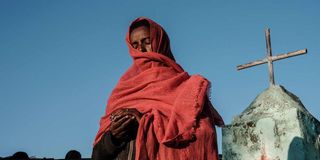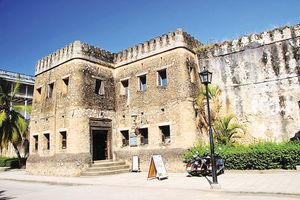Abiy says Ethiopia working to restore order in conflict-hit Tigray

An Ethiopian refugee who fled the Tigray conflict prays during Sunday Mass at an Ethiopian Orthodox church building built by former Ethiopian refugees, at the village next to Um Raquba refugee camp in Gedaref, eastern Sudan, on December 6, 2020.
Yasuyoshi Chiba | AFP
Addis Ababa. Ethiopian Prime Minister Abiy Ahmed on Monday said efforts were under way to restore order in Tigray, where doctors and humanitarian workers say fighting and lawlessness were hindering aid delivery to desperate civilians.
Abiy, the winner of last year's Nobel Peace Prize, on November 28 declared victory in Tigray after the army captured Mekele, the regional capital, following nearly a month of bloody conflict in the country's north against the Tigray People's Liberation Front (TPLF).
But the TPLF vowed to fight on and the United Nations said on Friday that continued clashes in Tigray were complicating efforts to reach hundreds of thousands of people in dire need, despite a deal granting them access to territory under federal control.
Abiy repeated Monday that military operations were over in Tigray, adding that the protection and security of civilians affected by the conflict "remains an essential priority".
"The current task of the federal government mainly includes bringing fugitives to justice, restoring law and order, guaranteeing our citizens in the affected areas have unfettered access to humanitarian aid" and resettling refugees and repairing infrastructure, his office said in a statement.
Abiy -- who announced the start of military operations in Tigray on November 4 -- also restated that Mekele had been captured "without civilian causalities and destruction of property".
Doctor's report
But a doctor at one of Mekele's main hospitals told AFP that 27 civilians were killed in "artillery and rocket shelling" on November 28 and more than 100 were wounded.
"The situation in our hospital is very critical," the doctor said, speaking on condition of anonymity.
"We have formally stopped providing services, including for wounded trauma patients, because of no light, no fuel for the backup generator, no gloves, no pain medication, antibiotics or food for patients and staff."
He also said there was no law enforcement in Mekele and "widespread looting" had taken hold, including by soldiers, with even the hospital ambulances pilfered.
"Following this, the people in Mekele expressed their anger by blocking roads throughout the city," the doctor said, adding that two protesters were shot by Ethiopian troops.
Communications blackout
Tigray remains under a communications blackout and media access has been restricted to the region so verifying claims from both sides has been difficult.
A spokeswoman for Abiy said "there were no air strikes in Mekele" but did not address the question of civilian deaths. A government task force set up in response to the Tigray conflict did not respond to a request for comment.
The conflict has claimed thousands of lives, according to the International Crisis Group (ICG) think tank, and tens of thousands of refugees have streamed across the border into Sudan.
The UN has been warning of a possible humanitarian catastrophe within Tigray, where around 600,000 people depended on food handouts before the fighting even began, among them 96,000 Eritrean refugees.
UN officials told AFP on Friday that access to Tigray was still difficult, despite the agreement reached with the Ethiopian government, and that aid was not expected to arrive until this week.
The EU commissioner for crisis management, Janez Lenarcic, told reporters on Friday that it was "not acceptable" that aid be restricted to areas under government control.





